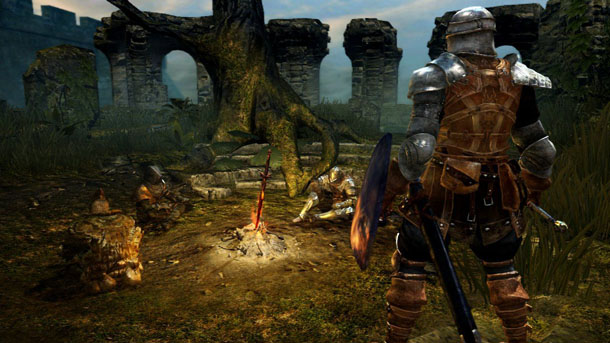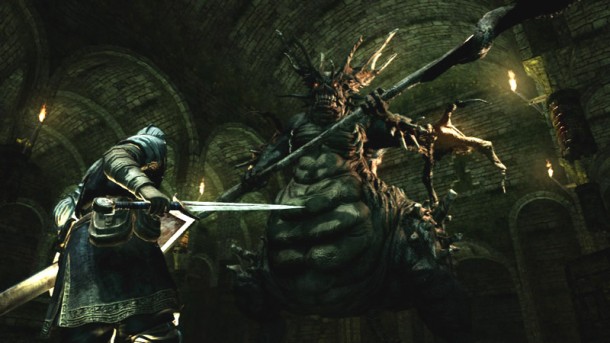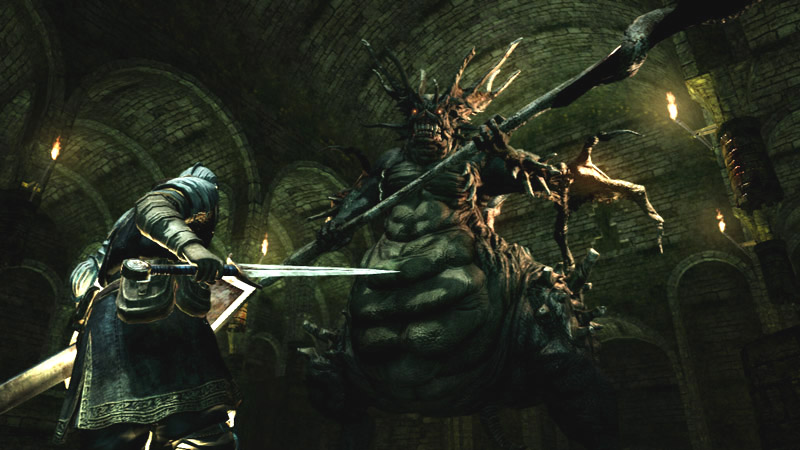
Playing a great game is a lot like having a dream. The best games can navigate you through the surreal and the illogical without ever giving pause to to consider that nothing you’re experiencing should be real.
Dark Souls approaches this stream of consciousness and opts simply to drift along its current. An open world with impossible geography, a mismatched story that asks only to be taken for granted and an art style that emerges from classical fantasy and slips into the stuff of nightmares, in particular some of the later bosses, all help to buoy the game’s phenomenal sense of flow. From the hamlet of Blight Town, perched precariously over a poisonous swamp to Anor Londo, where stone sentinels stand guard under flying buttresses and stone aqueducts, there is always something new and unexpected just around the corner. Seemingly without rhyme or reason these environs flow together liquidly. In a less lovingly constructed game, this seamlessness might have been confusing. Yet Dark Souls’ rock solid level design ensures that, even without the aid of an in-game map, a player would be hard-pressed to get lost amidst the dangerous and densely webbed world.
It’s fortunate that From Software managed to engineer such structure as anyone playing Dark Souls will be treading the same ground quite frequently.
In Dark Souls’ ‘spiritual predecessor’, Demon’s Souls, failure was almost always rewarded with death. Death was rewarded with starting an entire stage over again, often only to feel the reaper’s cold embrace all over again… and again and again. The system did not make the game more difficult; it made it draconian and cruelly punishing.

In Dark Souls, there are no stages to restart. The entire game is featured in an enormous and interconnected world. Now, manually activated checkpoints that heal the player and replenish a stipend of free healing items scatter the landscape. While this might sound like it would make the game too easy, first know that you will need to make use of these advantages every time they’re offered. Activating these checkpoints resurrects each fallen, non-boss enemy.
This is where retreading old ground comes into play. Each journey from one bonfire (checkpoint) to the next can be quite a journey. Rationing restoratives, ammunition and spells while dispatching your always formidable foes becomes a harrowing meta-game. All of this means that the discovery of a new bonfire or a shortcut becomes much more rewarding than the carrot of incrementally increasing statistics dangling by other action-RPGs.
Ambiguity is a rare thing in video games. But like the most convincing dream, you will always find yourself inexplicably drawn forward to some ultimate conclusion. That is, if the frustration doesn’t set in first.
Dark Souls is largely directionless. Core gameplay concepts are introduced on the fly, sometimes hours into the game; many can even be missed, eliminated or skipped altogether. The game’s (barely noticeable) tutorial is left intentionally ambiguous. While combat is tight, fun and highly rewarding to experimentation, one false move against even the most basic enemy can lead to a quick and inglorious death. And trust me, the enemies in Dark Souls are anything but basic.

And of course, in Dark Souls death means quite a lot more than the being kicked back to the previous checkpoint. Death carries the unfortunate consequence of removing all unused souls, the currency used both for bartering and experience points. There is a chance that souls can be retrieved but oftentimes they are ultimately lost. This heavy penalty is often what most people mistook for high difficulty in Demon’s Souls and it makes a return in Dark Souls.
Unfortunately, this treadmill progression can lead to the frustrating notion of treading water in terms of progression; hours of the gameplay progression can be lost with nothing to show for it. Fortunately, it also means that success and discovery in Dark Souls is all the more rewarding. Combating a massive, overpowered boss and coming out alive is all the more rewarding when death holds real consequences. The balance between difficulty and skill is balanced on a razor’s edge. Coming out on the other side of an engagement battered and bloodied is exhilarating and terrifying. You never come out of a tough battle in Dark Souls without feeling like you’ve really accomplished something. For a video game, especially in the age of the quick-time event, that’s no mean feat.
The risk-reward system is what kept Demon’s Souls players returning for more punishment and it’s what will keep you coming back to Dark Souls for a hundred hours or more.
The developers want the player to assert their own exploratory and determined natures either alone, or with the help of friends. The game’s message system allows players to leave helpful tips or dangerous tricks for their fellow players. There are more traditional cooperative and competitive modes available for those that wish to partake in them, but the idea of turning another player’s very environment into a hazard or a help is far more intriguing. It also helps to alleviate some of the less artistic ambiguity from the equation.

However, no amount of innovation, art or the refreshing necessity of concentration can heal the scars left by bad technology. While the game is artistically hypnotic, textures and lighting can leave a lot to be desired. Technical issues with the graphics might have been more acceptable if the frame-rate didn’t drop to an embarrassingly low number in certain areas of the game (I’m looking at you, Blight Town). An oftentimes bad camera only serves to exacerbate the gameplay issues in these times of technical distress. Issues like these simply aren’t acceptable in a video game this late into the console cycle. However, I find these issue to be infrequent enough to only leave me frustrated with the fact that they keep Dark Souls from attaining perfection. They’re really only a skip in the record when compared to the symphony of what Dark Souls accomplishes.
Dark Souls will never hold your hand. It won’t help you unwind after a hard day’s work and it might not always leave you feeling pleased with how you spent your time playing it. However, it offers an experience like few other games these days. It wrapped its unreality around me and rarely allowed me to remember that it couldn’t possibly be real in a way few games have made me feel since I was young. Dark Souls may not be perfect, but it is perfectly transportive. And that is exactly what a video game should be.
This review is based on a copy of the game purchased by the reviewer for the Playstation 3



2 Comments